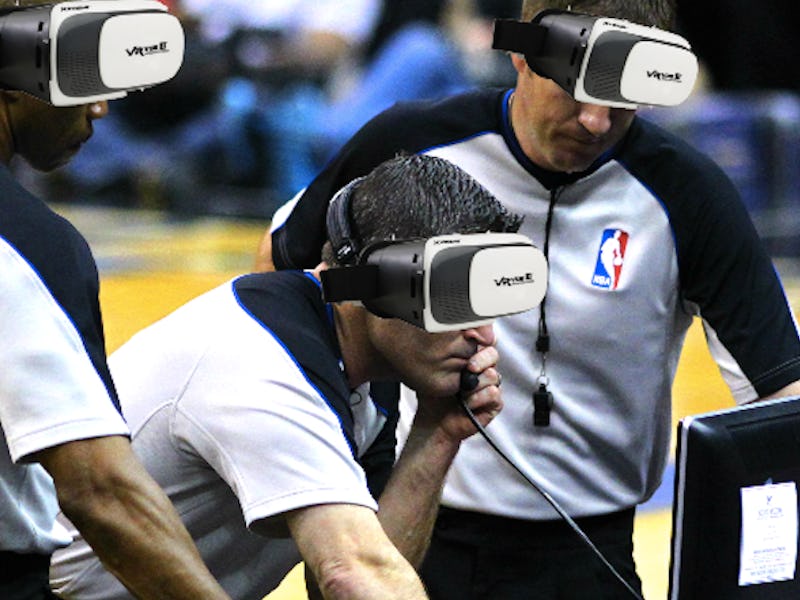In an effort to improve officiating, the NBA is going even further in the direction of Silicon Valley. On Thursday, the league announced several “significant initiatives to enhance performance, training, and development of referees,” including using virtual reality.
“Leverage technology to develop innovative methods to train officials, including the use of virtual reality,” reads the third of seven bullet points in this league announcement.
Whether this means the league’s current 64 referees will be strapped to Oculus Rifts to watch 360-degree virtual basketball games hasn’t been announced, but the NBA’s belief is that the technology will improve the accuracy of calls.
President of league operations Byron Spruell told the Associated Press that NBA referees do “a good job” but they could do better if their performance could be evaluated with a “very comprehensive data system.”
But exactly how VR training could enhance the quality of referee’s work is very much determinant on what aspects the league believes it need to improve. How well a referee does is based off an ability to process complex information quickly and without bias; it’s a blend of physiology and psychology.
Studies are mixed when it comes to whether NBA referees on average demonstrate substantial bias when making calls, with some researchers saying refs do show preferential treatment to the league’s superstars and are affected by hometown crowds, and other researchers saying they do not. If the idea is to use VR to train the behavioral responses of referees — and squash any biases — the technology can only work in that regard if the referees regard the avatars they see in virtual reality as real people.
While a 2014 study found that how real people treat avatars in virtual reality can later affect how they interact with people in the real world, how influential that experience comes down to whether or not people begin to interpret the virtual world as real. That reaction, so far, is not a ubiquitous one.
Would Tim Duncan still had been ejected by referee Joey Crawford for laughing at his call while on the bench, if Crawford had been trained by VR beforehand? Probably.
But if the NBA thinks the average of correct calls made will rise if the visual-spatial ability of referees is improved, then VR stands a better chance of actually influencing a change. A 2014 study in the Journal of Human Kinetics found that officiating games induces complex visual spatial perception processes, because they have to rapidly work through huge amounts of information coming from different sources in a large space. When a group of people move into the paint, half to score and the other half defending, the referee is both watching and predicting movement — or, more technically, the spatial relationship.
Virtual reality has been proven as a good tool to train people’s spatial ability — whether or not the person was being trained to work through mazes quicker or make better spatial judgments during a virtual surgery. It’s fair to say it could be a training tool for NBA referees as well.
A surgeon practices operating with virtual reality.
Whether or not referees can be coerced into using virtual reality is another question. Tension has been building between the league and its refs since the 2015 induction of the Last Two Minute reports, which are public reviews of calls and non-calls made in the last two minutes of close games. Referees and many players have denounced them as pointless while the NBA says they are a transparent effort to improve officiating. In a statement, the National Basketball Referees Association alluded that efforts to perfect the system, like how virtual reality is being employed now, is to the detriment of NBA basketball.
“Efforts to promote transparency have encouraged the idea that perfection in officiating is possible,” the statement reads. “Perfection is neither possible nor desirable; if every possible infraction were to be called, the game would be unwatchable and would cease to exist as a form of entertainment in this country.”
